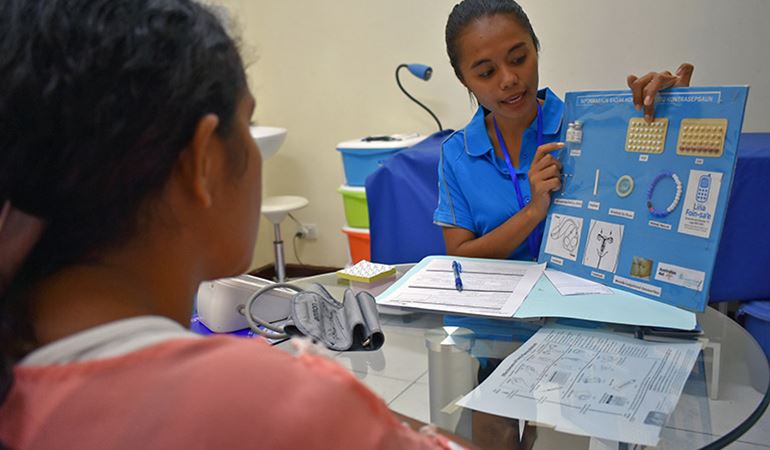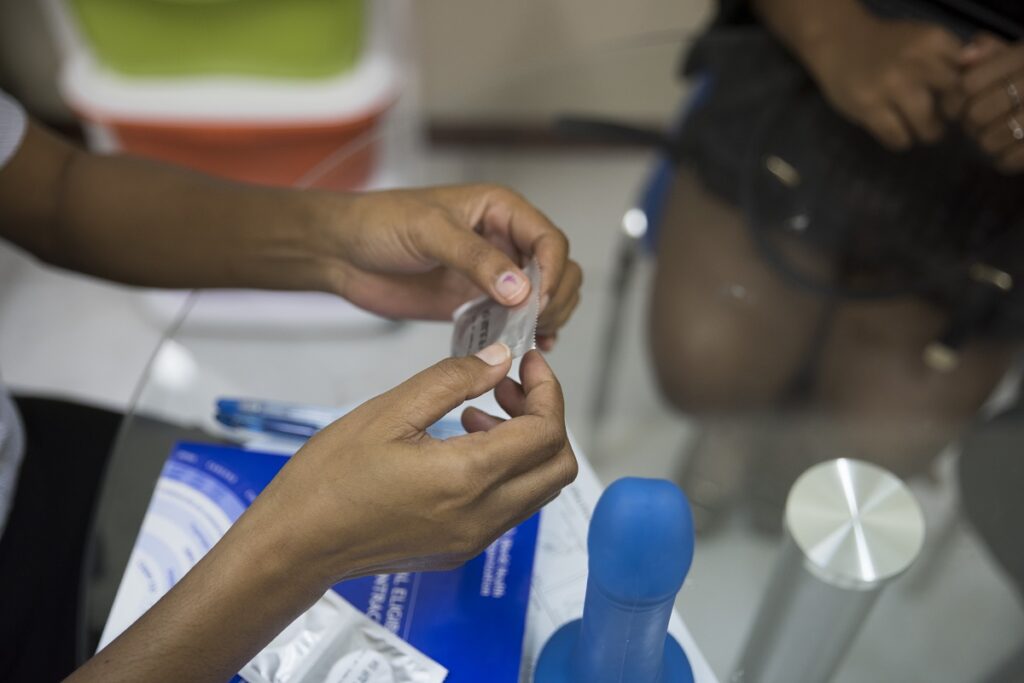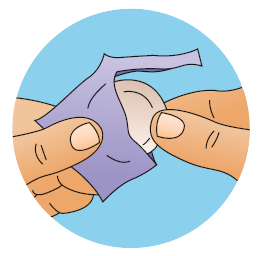Male condom
Providing both pregnancy and STI prevention.

A short-acting method of family planning
The male condom is a barrier family planning method for preventing pregnancy and STIs.
When used correctly, condoms are highly effective. Condoms are also the only contraceptive method that protect against both pregnancy and sexually transmitted infections (STIs), including HIV and syphilis.
Effectiveness
85%. Not using the condom correctly can increase the risk of unplanned pregnancy and STIs.
Availability
At the Family Health Clinic in Dili and through outreach teams in the municipalities where we work.
Pricing
Free through outreach, and free at the Family Health Clinic.
Call the Family Health Clinic on 3322 841 for more information.
Advantages of a condom
The condom can offer several advantages as a method of family planning:
- Only needs to be used during sex.
- Help to protect both partners from some sexually transmitted infections, including HIV.
- No side-effects from using condoms.
- Come in a variety of shapes and sizes.
- Available for free at all of our services.


Things to consider
When deciding if the condom is right for you, here are a few quick facts you should consider:
- Can sometimes slip off or split.
- When using a male condom, the man has to withdraw after he has ejaculated, and before the penis goes soft, holding the condom firmly in place.
- Some people are sensitive to latex condoms, though this is rare.
- After use, condoms should be disposed of carefully and a new one used every time.
If you are still unsure whether condoms are right for you, take a look at our online contraception tool – Choice. The website uses a simple questionnaire to provide you with clear, tailored advice on your contraceptive options.
How a male condom works
The male condom is a thin rubber sheath that goes over the penis during sex.
The condom is a barrier that stops a man’s semen from entering into the woman, preventing pregnancy and sexually transmitted infections.
To be effective it is very important that condoms are used correctly. They need to be used properly every time a couple has sex. This means wearing it throughout the entire sex act, and using a new one every time.

“Condoms are the only modern method of family planning that can prevent both unplanned pregnancy and STIs. They are also a great way for men to be active and responsible partners in preventing unplanned pregnancy.”
Service provider
Using a condom properly
Make sure you and your partner follow these steps when using condoms.
- Use a new condom each time you have sex. Check the ‘use by’ date on the packet. Be careful how you take the condom out of the packet – sharp fingernails and jewellery can tear the condom.
- Find the teat or closed end and squeeze it to get rid of air. This will also help you roll the condom on the right way around.
- Put the condom on when the penis is fully erect and before it touches the vagina or genital area.
- Still holding the end, roll the condom all the way down the penis.
- If it won’t roll down, then it’s probably on inside out. If so, start again with a new condom as sperm could now be on the first one.
- If you have foreskin, you may find it easier and more comfortable to put the condom on if the foreskin is pulled back. This lets the foreskin move freely and reduces the risk of the condom tearing or slipping off.
- As soon as the man has ejaculated, and before the penis goes soft, hold the condom firmly in place while withdrawing it. Do this slowly and carefully so you do not spill any semen (the ejaculation fluid that contains sperm).
- Take off the condom, wrap it and put it in a bin.
- Make sure the penis does not touch the genital area again, and if you have sex again, use a new condom.
Worried you may be at risk of pregnancy or sexually transmitted infections (STIs) from unprotected sex? We recommend coming for a consultation as soon as possible.







